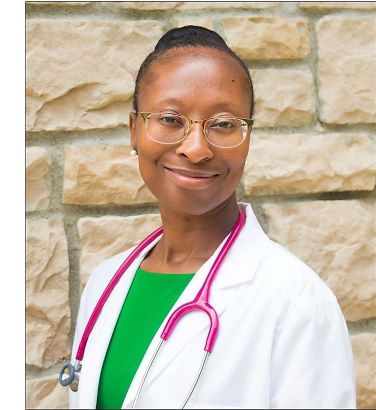
2000 alumna focuses on children’s health & wellness
Thursday, March 18, 2021
Dr. Tabitha I. Jones-McKnight is a second-generation UMES alumna who today is a pediatrician in Ohio, where she also teaches the next generation of doctors about to enter a profession forever changed by the COVID19 pandemic.
A working mother, she gravitated to study science as a child. When Jones-McKnight was a teen, her mother received a kidney transplant and that family health challenge set her on a path to study medicine.
“One of the reasons I chose UMES … was the smaller class sizes as compared to some of the larger universities I had visited,” she said. “Attending the University of Maryland Eastern Shore was an excellent choice … as it gave me the opportunity to learn how to navigate college life as a young adult and coursework.”
“There was also the UMES-University of Maryland (Baltimore) Honors Program for individuals planning to attend medical school,” she said. “I was able to learn from instructors who genuinely cared about the success of students. Professors were always willing to take extra time to review concepts and answer questions whether course related or career related.”
How did UMES prepare you for your career?
“It provided me with many opportunities, including the opportunity to tutor others in the sciences. I realized I enjoy teaching and helping others learn important concepts, which helps me now in my teaching roles. Thanks to the rigorous preparation for scientific presentations at professional conferences, under the guidance of Dr. Kelly Mack, I learned how to prepare for scientific presentations and lectures.”
“As a physician, I communicate with caregivers and parents of children I see (daily). All of the interactions I had at UMES helped to lay the foundation for the many roles I have today.”
What would you tell high school students weighing their higher education options?
“Choosing a historically black institution was a great experience for me. I not only gained knowledge and skills essential to what I do today, I also have been able to maintain some of the friendships and acquaintances formed while at the University.”
“It is important the school you choose has professors who are invested in your success and offers opportunities that will help you grow professionally.”
“It may not always be easy, but if you put in the work – the time studying in the library when everyone else is on the Yard, going to (faculty) office hours to ask questions, taking advantage of study and review sessions offered by professors for the class – you can achieve all that you imagine and more.”
The pandemic has brought “health disparities” into everyday conversation. What does it look like from the front lines?
“Some that I have encountered are … infant mortality and safe sleep, asthma and nutrition in minority children. It is important for parents and caregivers to receive the education about safe sleep … before the baby is born, and that those messages continue to be discussed after the baby comes home. We have to build trust and understanding of why it is important … for anyone who is going to be caring for a child to be educated on what a safe sleep environment looks like and ensure there is a safe space for an infant to sleep in every environment where they are going to be cared for.”
“Having access to a crib, a bassinet, or a pack n’ play is important for a caregiver to have the means to create a safe sleep environment. Eliminating those barriers to access is vital.”
“I have also seen children impacted more severely by asthma due to environmental triggers. Minority children may be living in public housing, exposed to secondhand smoke that does not necessarily come from inside their unit, which can contribute to asthma flares and exacerbations. Many parents do not have the option or finances to relocate – or seek other housing to reduce exposure to these triggers.”
“Minority children (also) have been disproportionately affected by being overweight and obesity, which has its early beginnings in infancy. Nutritionally, infants are often started on baby foods too early, offered juices too early and in excess, and are less likely to be fed mother’s milk for long.”
“More education is needed in many communities on the benefits of consuming mother’s milk or human milk, along with environmental and community efforts to support families who want to.”

